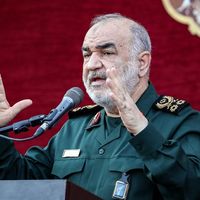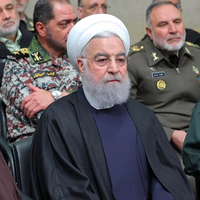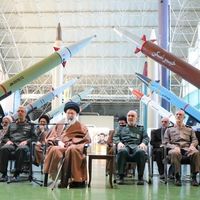IRGC says its missiles can strike any enemy target
Iran’s Islamic Revolutionary Guard Corps (IRGC) commander-in-chief said that the force’s missile systems "can hit any enemy target in the region and overcome enemy anti-missiles" as the country rebuilds its defences after Israel's October aerial barrage.
Hossein Salami told Tasnim News Agency Monday: “The IRGC today is much more advanced in the field of weapons and much more experienced in skills.”
He described Iran’s military strength as a key factor in deterring adversaries, pointing to past missile strikes as proof of the IRGC’s capabilities.
The comments come just months after an aerial attack from Israel severely damaged Iranian military infrastructure.
The Institute for the Study of War said of the October strike: "The IDF [Israeli military" conducted precision strikes targeting around 20 locations across Iran, including facilities tied to the Iranian drone and missile programs and air defense network."
In a separate interview, Mohammad Reza Naqdi, a deputy commander of the IRGC, told state television Sunday: “Whenever we want, we can put any point in the world under the missile range."
The statements come as Israeli Prime Minister Benjamin Netanyahu announced on Sunday that his Monday meeting with US President Donald Trump will include talks on the ongoing threat from Iran.
Reza Naqdi added: “Any range, in any point in the world, that the system and the Supreme Leader wants, is not beyond the technological reach of the Islamic Republic’s military forces.”
Salami highlighted the importance of the IRGC's navy in Iran's defense systems after the IRGC Navy unveiled another underground missile base in the coastal areas of southern Iran on Saturday.
The IRGC also unveiled a new cruise missile, named Ghadr-380, which has "anti-jamming capabilities" and a range of more than 1,000 km (more than 600 miles), according to IRGC Navy Commander Alireza Tangsiri.
Iranian President Masoud Pezeshkian framed Iran’s ballistic missile and space launch programs as defensive rather than offensive on Sunday.
“We have worked to continuously strengthen our defense capabilities with the efforts of dedicated, innovative young scientists,” he said at a military exhibition.
“This development will continue, and dear Iran will join the ranks of countries conducting extraterrestrial flights, showcasing our nation's scientific strength.”
Iran has developed an estimated arsenal of 3,000 ballistic missiles, according to US intelligence assessments.
Iran launched hundreds of drones, rockets and ballistic missiles at Israel last year, demonstrating its ability to strike its archenemy despite extensive missile defenses.
Iranian hardliners have warned that a return to diplomatic negotiations under Donald Trump could include renewed efforts to curb Iran’s missile program.
Tehran has repeatedly ruled out missile-related talks, maintaining that its military strategy is non-negotiable.







